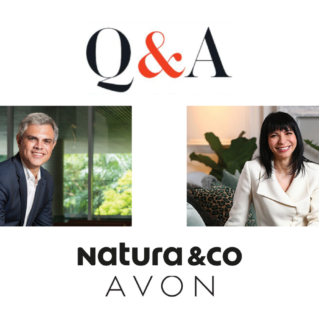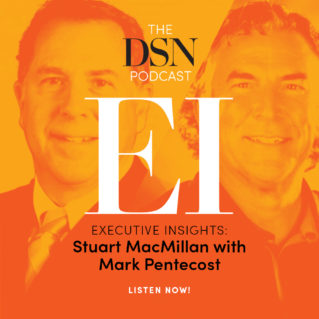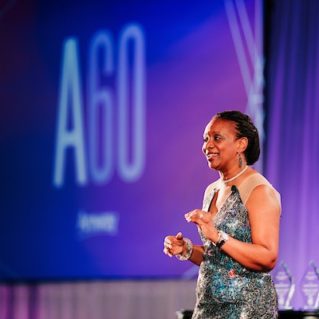This Q&A is part of the October 2018 Company Spotlight featuring Perfectly Posh.
The beauty market is a crowded space. What kind of gave you the idea that you could do something different, provide something unique?
Ann: Yeah, Dry skin. I knew there was a huge gap in the market. You cannot find things that are good for you, and fun to use. You can find things that are good for you, and they look and smell like your doctor gave them to you. Or you can go to Victoria Secret Body Shop, Bath and Body Works, even Lush, and it’s a lot of fillers and fragrance, and things you don’t want to put on your body. It is difficult to find really good ingredient decks, but at the same time, those brands tend to take themselves so seriously, and it takes the fun out of it.
Eddie: The magic happens when somebody picks up our products, The Stripper or the Gender Bender, it’s all fluffed up, it’s funny. They’ll pick it up, take it home almost as a joke, and then you use it, and then they think, Wait a minute. Hey, this is really good stuff.
Perfectly Posh, the name, how did that come about? Is there a story behind the name?

Ann Dalton
Ann: It was an inside joke between my husband and me when we were poor and newly married. It was always a joke when we said, “We can afford it, we’re posh.”
It was jokingly aspirational when you put “Perfectly” before it. Love the Ps, love the alliteration of it. It was so fitting because there is an aspirational quality to what we do. You might not get a whole day off or be able to afford a $250 massage, but you can take 10 or 15 minutes and pamper yourself and feel great.
For a few months, we have been asking our audience how does the direct selling industry compete against the likes of Amazon, and all the big e-commerce giants and in your case, Sephora & Ulta. How does Perfectly Posh compete?
Ann: From a brand and market perspective, we really did try to come in and look at it much more like a skin care pampering company would and not as a direct sales company. We’re proportionally heavy. We’re very seasonally heavy. We do many things very differently than a direct sales company would. It gives us a real advantage.

Eddie Silcock
Eddie: The marketing and creative team are in tune with what that this generation’s about. The packaging, the product, and the imagery stop people. It’s rebellious. I think that the whole generation coming through are much more about, being part of something bigger than themselves. They’ve got the right to actually have some balance, to say no. In a world where you cannot stop people from scrolling online, from our social media, imagery, product names, the one thing I really love that Ann does is she likes to shock and make people stop.
Ann: Eddie gets all the “I’m offended” emails.
Eddie: The point is, it’s interesting, we push, we can be a bit snarky, it pushes boundaries, but at the same time, the overall message is you deserve this. There are many companies that have products that will improve your health, but I genuinely think that our brand entices a whole new generation.
So many companies face the same problems, right? One being their salesforce is aging—where most of their leadership is in their late 30s to 50s—how do you connect with these upcoming generations? How do we go after the next generation? We feel our brand is positioned to connect with the younger generations.
How do you make it easier for customers to get a seamless experience? One of your advantages (being a one on one business model) also can be a disadvantage as it puts one more layer that customer has to go through to get your product.
Eddie: One of our biggest strategies right now is looking at how we ensure that everybody can access our products. Our consultant base wants us to have more brand awareness. We just hired a brand-new head of marketing. She’s very experienced in the world of social media and brand awareness.
Eddie: As I travel, I say I work for Perfectly Posh and very few people know who we are. That’s a massive opportunity. Because, literally, if we’re seeing a return on results, without any brand awareness, when get our SEO and our brand awareness where we want it to be, it’s going to be a very different world.
Ann: Let’s just say, the only thing we did right, for a long time, was brand. And now, as we’ve got the infrastructure in place, and start to focus on less organic growth, we see a lot of opportunity.
Are you only in the US? Are their plans for expansion to other lands?
Eddie: The US is potentially a half a billion-dollar business gross. We don’t want to keep the eyes off the prize, because the mothership has got a long way to go. And then, go international. The US is barely tapped in yet.
Your UnCon event (short for unconventional) wasn’t too long ago–what was some of the feedback that your consultants were giving at the event?
Ann: We grew up. I think that’s probably the overriding message I heard. It’s been great to get Eddie on board, and a really strong executive team. It’s not the Ann Dalton show anymore. It is very goal and work oriented.
Eddie: To add what Ann said, I think we’re listening better to what the field needs. We were able to launch commissions so they now get paid immediately. That’s industry leading. At UnCon, not only did we raise the energy levels, we gave them some significant goals to focus on, testimonials and training.
What’s the first impression you want to give to a new consultant or a customer that comes on board?
Ann: We want to give one of empowerment. I think people sell themselves short far too often. I joke about a story about our tenth wedding anniversary–we still had three little boys, and I lived in sweatpants and a t-shirt. My husband gave me earrings for our tenth wedding anniversary, and it had been two years since I put on a pair of earrings. “Why would you get me earrings?” I asked my husband. He’s like, “You used to wear jewelry. I miss it.” It’s that realization that it’s okay to take time for you–whether it’s putting on a face mask or some hand cream.
That’s the beauty of this industry. It lets people be very creative and very scrappy. It allows them to take a little opportunity, a lot of vision and work themselves into some magical situations.
Hopefully, that’s the same thing our customers feel to some degree. They come in and try products, and it doesn’t have to be expensive. It doesn’t have to be complicated. It’s these beautiful, natural ingredients. They’re very, very fun to use. When they try it on, we hope they feel I’m a little bit better because I did that.
Eddie: I would add to that, that we layer everything with fun. It’s probably one of the most fun companies that I’ve been involved with. Today, I interviewed a consultant today for our Posh Cast, and this person literally built their business on fun and energy. It’s about you need to have fun in your life, and these products help you do that. It’s empowerment together with, don’t take it too seriously, having fun, while you’re going along the way.
What is your product cycle? Is there a life cycle to them– then you’re always adding new ones? What’s your product philosophy?
Ann: This is one place where we didn’t do direct sales anything. We looked at Philosophy, Soap and Glory, some of those other really good brands that are out there, and we said, what do they do? It’s seasonal–the hand cream I want in my bag today doesn’t smell anything like I’m going to want when it gets cold out. We tried to resonate with the trendsetters and the early adopters– going back to the younger demographic.
Ann: What we’ve got is a foundation–there are a handful of things that have been around since day one– just really good basics. The beautiful thing about what we do, is soap’s never going to go out of style and people would say it’s one of the most boring things you could do. And yet, we bring in Always Gonna Love You, or Fantasy That. You bring in the Unicorn Soap, and all of a sudden, it’s this beautiful, trendy story. We’ll come out with trendy things all the time. We’re working on some Halloween stuff today. It launches right after Labor Day. We do a lot of LTO (License to Operate), so it’s “get it while you can.” We have about 100 products that live in that core. We will have anywhere from 10 to 20 products that come in seasonally and supplement that story.
Eddie: We also will link a product launch to an event, which is themed. The leaders come dressed up, to the events. We had a Resting Mermaid Face product launch in April, and then the consultants all came dressed as mermaids.
What, is the one key performance indicator that you guys are always looking at each month? That lets you know, either you’re on the right track, or there might be some slippage?
Ann: How many people are working–Is that up or down–is one indicator.
Eddie: It’s about the revolving door. As a company, we want more people coming in than leave, customers and the consultants. To realize what we want to achieve in the US, we need new people all of the time. Look at it geographically–Texas, for example, is bigger than half of Europe–and we barely exist there in terms of potential sales. That’s what blows my mind about … It’s just about strategy to access all these customers who don’t even know we exist yet. New customers, total active consultants.
What marketing tools do you offer your field?
Eddie: I feel that the collateral we give to our leaders is probably some of the best I’ve ever seen. We do everything from banners, to collateral, to help support them in the social media world. We do a lot of short promotions, in two days, just to get energy moving. We are relaunching our onboarding with a brand-new program starting October 1st.
Ann: We support them when they get their swag. We try to approach it from a teamwork perspective. At any point, we launch something, our consultants they dress up, they’re very excited. It’s trying to get them to be hands-on and jump in with us.
What main initiative is your company working on the rest of this year and into 2019?
Eddie: SEO brand awareness is probably our initiative right now, and we feel it will change everything for us. Right now, as I travel across the country and when I say I work for Perfectly Posh, very few people know who we are. That’s a massive opportunity for us and a great problem to have.
Ann: Opportunities to be less organic. We’re very much a democratized brand. A consultant can take it, love the personality of the product, and put their spin on it. That does cost us in the ability to have the brand be tight, but the tradeoff is worth it. We want to be able to get our arms around telling stories which will help us in attracting people looking for what we have to offer.
As CEO, how do you measure Success?
Ann: A Paris office. I mean, it’s about world domination (laughs). Just taking a few minutes to pamper yourself. The entire world needs that. Our mantra is you live a busy life, and you deserve 10 minutes of your life just to feel good. I think that’s a worldwide message, so I think that’s a real success. And absolutely someday being an international brand.
When it comes to the company–what are you most proud of?
Ann: Seven years in business and still keeping the doors open. We joke about this sometimes, but there’s a real truth to it–especially for the first five years we were in business. The only thing we did right was brand. Just think about anywhere else in the industry, it’s the reverse. We want a brand that it can live forever, be trendy, universally appealing and has traction. It’s let your hair down, have a good time. It’s to have a brand that is tight and solid and lasting. This is who we are, and we have stayed true to it.
Eddie: We know there will be inevitable bumps in the road going forward, both operationally and technologically. We feel we have built a solid brand and business foundation, with great people—consultants and employees— that we will be able to lean on to get us through those hard times. We will learn from them, and then go forward and do a lot of incredible things together.
What advice would you give your executive colleagues in the industry as far as what you’ve learned over your years?
Ann: Having been in this industry for almost 13 years, I remember hearing someone at a conference comparing many companies in the direct selling industry to five-year-old’s playing soccer. It’s just a bunch of kids chasing a ball, essentially following the one thing that’s moving.
We’ve come into this space and tried to just authentically be us, and do things for the right reasons in spite of what the skin care and direct sales universe thinks we should be doing. I think that’s where we can win. The world and business have changed within direct sales. My two cents would be to focus on doing the right thing for the right reasons and to be a little disruptive. Take a chance, try something and leverage some of the opportunities that out there to stand out and be unique. I think that’s where we’ve been able to come in and be a little bit different.


